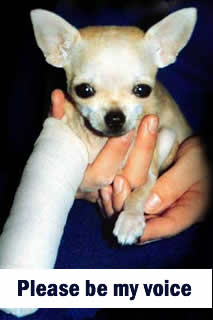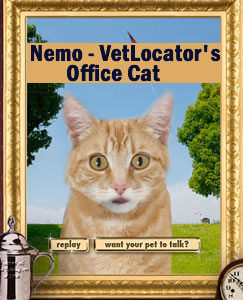
Speak up for your pets!
Picture this. Your dog has had a chronic cough for over a month.
You took your dog to your veterinarian soon after he started coughing and have been dutifully giving him the medicine your vet prescribed, but he does not seem to be getting better.
You call the vet and he asks questions about your dog, how he’s feeling, what’s happening. You wish your dog could answer the vet directly but, unfortunately he cannot. Your dog is counting on you, as his advocate, to speak for him.
So that’s what you do.
You can’t add anything to what you already told the vet and, while he has some other suggestions for your dog, you’re not feeling too good about what he’s saying.
Should you get a second opinion?
Maybe.
Whether you should get a second opinion depends on several things. First is your relationship with your vet. do you feel like you are working together to solve your pet’s health problem? Is the relationship already suffering from a poor communication level and this is the straw that’s about to break the camel’s back?
So when should you get a second opinion for your pet?
When you’re told something health-related for your pet, you need to use the same kind of judgment you would use in dealing with your own health or the health of your child.
Consider what kind of situation you have (how serious, what you’ve just been told, what the options are, etc.), then think about what you would do if you’d just received similar advice from your physician or your child’s pediatrician.
Would you feel comfortable working with your health provider in trying to work for a better solution or would you feel better asking for a second opinion?
The same advice applies to your pet’s vet.
The decision for asking for a second opinion becomes a lot easier when your vet tells you your pet needs surgery or an expensive treatment in order to fix what’s broken. In a scenario like this, it is a good idea to ask for a second and maybe even a third opinion.
Here are some questions to answer when considering asking for a second opinion:
- Does my vet seem to know about what’s wrong with my pet? Sometimes taking your pet to a veterinarian who specializes in, for example, feline medicine if you have a cat, is a good idea if your general medicine vet is not having success in treating your cat.
- Is my pet not getting any better or deteriorating under my vet’s care? This certainly is a good reason to get another opinion, and FAST! If you are close to your current vet, ask for a specialist recommendation. Most vets are fine with recommending a specialist and can give you the names of some they trust. They are on your side in improving the health of your pet.
- Has my relationship with my pet’s vet been close up until now? If it is, do I feel like my vet can help us find the right solution for my pet’s health issues? You should be able to answer yes to both of these questions. If you can’t get a second opinion.
- Am I unwilling to take my vet’s advice for tests and procedures because I’m unsure if he/she is right? If your vet has been recommending tests and treatments that you aren’t willing to do because you think they may be unnecessary, you are not working with your vet and this is not helping either of you. If this is the case, get a second opinion.
- Do I feel like my vet has answered all of my questions and I have a clear understanding of what’s wrong with my pet, what my options are and what the costs might be? If the answer is no, then it’s time to either get with your vet and get your questions answered or ask for another opinion.
- Does my vet listen to my suggestions when discussing my pet’s condition or does he/she treat me like I’m stupid and my suggestions are without value? Obviously if you leave your pet’s vet feeling like you’re questions and needs have been ignored, it’s time for a second opinion.
- Ask your vet “What would you do if this were your pet and you were me?” If you are comfortable with the answer then take your vet’s advice for treatment. If you are not, get a second opinion.
How do you ask for a second opinion?
If you’ve decided you need a second opinion, here are some suggestions on how to find one.
- Ask your current vet
- Use one of VetLocator.com‘s pet pro directories. Local, House Call, Specialty, Holistic/Alternative and more.
- Ask for suggestions from friends. If you are a ‘social web’ person, using Facebook and Twitter can give you some good suggestions from pet owners in your area.
When you take your pet for a second opinion it’s important to come armed with as much information as you can. Your pet’s medical history, medicines, operations, age, vaccines, etc. Be up front and honest with the second vet on what your previous vet told you about your pet, what tests were run, etc. It’s a good idea to let your original veterinarian know you’ll be asking for another opinion because the 2nd vet will need to have access to your pet’s health records. Staying on good terms with your pet’s original vet is a good idea because most of the time they have a relationship with both your pet and you.
And realize that getting a second opinion and even taking your pet to another vet does not mean you’ll need to switch permanently, especially if you’ve gone to a veterinary specialist.
And then there are those times when we don’t want to accept what our pet’s vet is saying, and we blindly take our pet for other opinions hoping someone is going to tell us something different.
We’ve heard from some vets that say they’ve given ’15th opinions’ to to pet owners who refuse to accept what they are being told about their pet’s health. That’s not good. Not good for your pet, not good for you, not good for your pocket book.
So don’t be afraid of being an advocate for your pet and don’t be afraid to get a second opinion if you feel one is warranted. Your pet will thank you for it.




